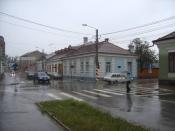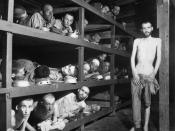Often, the theme of a novel extends into a deeper significance than what is first apparent on the surface. In the novel Night by Elie Wiesel, the theme of night and darkness is prevalent throughout the story and is used as a primary tool to convey symbolism, foreshadowing, and the hopeless defeat felt by prisoners of Holocaust concentration camps. Religion, the various occurring crucial nights, and the many instances of foreshadowing and symbolism clearly demonstrate how the reoccurring theme of night permeates throughout the novel.
Faith in a "higher power" is often used as a crutch by many in times of struggle. However, when that crutch is removed, the hardships that need to be overcome seem to increase as hope diminishes. This is true in Eliezer's situation; as his faith deteriorates, his spirit is taken over by night: an empire of darkness takes control over his inner being (Fine 53).
From the moment he enters Auschwitz, darkness becomes internal when he loses faith in God (Fine 49). From this loss of faith, a sense of desertion and emptiness is created; Eliezer feels he is left alone in the darkness without God, trapped in one long, hellish night ("Night" 243). In spite of these overwhelming emotions, originating from the cruel and brutal treatment he endures, Eliezer manages to muster what little hope his weakening faith allows. Unfortunately, this hope, this light in the darkness, becomes a heavy burden to bear for such a weakened spirit as his ("Night" 244). The frailty of Eliezer's wavering faith is shown with the words, "This day I had ceased to plead. I was no longer capable of lamentation. I was the accuser, God the accused. My eyes were open and I was alone-terribly alone in a world without...


